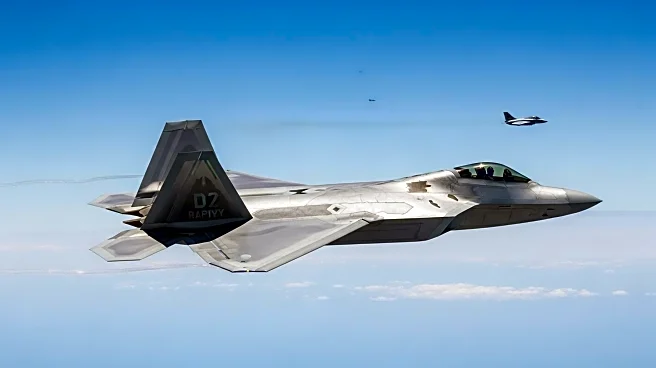What is the story about?
What's Happening?
In 2013, a U.S. Air Force F-22 Raptor stealthily intercepted two Iranian F-4 Phantoms that were approaching an American MQ-1 Predator drone in international airspace. The Raptor pilot, Lt. Col. Kevin 'Showtime' Sutterfield, maneuvered beneath one of the Phantoms to assess its armament before delivering a warning over the radio, prompting the Iranian jets to disengage. This incident, confirmed by then-Air Force Chief of Staff Gen. Mark Welsh, demonstrated the F-22's capabilities in defusing potential threats without engaging in combat. The event underscored the strategic importance of escorting drones following a previous Iranian attempt to shoot down a U.S. drone in 2012.
Why It's Important?
The interception highlights the strategic role of stealth technology in modern aerial defense, allowing the U.S. to protect its assets without escalating conflicts. The F-22's ability to operate undetected provides a significant advantage in maintaining air superiority and deterring hostile actions. This incident also emphasizes the importance of drone escorts in safeguarding reconnaissance missions, which are crucial for intelligence gathering and national security. The U.S. military's proactive measures in response to previous threats illustrate the ongoing need for advanced defense systems to counter potential adversaries.
What's Next?
The U.S. military may continue to refine its drone escort protocols and invest in stealth technology to enhance its defensive capabilities. Future engagements could involve more sophisticated tactics to ensure the safety of unmanned aerial vehicles in contested airspace. Additionally, diplomatic efforts might be pursued to address airspace violations and prevent further incidents. The development of international agreements on drone operations could also be considered to mitigate risks and promote stability.
Beyond the Headlines
The incident raises questions about the ethical implications of using advanced military technology to influence international relations. The ability to deter threats without direct confrontation reflects a shift towards more strategic and less aggressive defense postures. This approach may influence global military strategies and encourage other nations to invest in stealth capabilities. The event also highlights the potential for technology to redefine traditional concepts of warfare and diplomacy.















